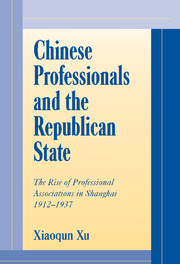 Chinese Professionals and the Republican State
Chinese Professionals and the Republican State Book contents
- Frontmatter
- Contents
- List of Tables
- Acknowledgments
- Abbreviations of Frequently Cited Sources
- Introduction
- Part I Professions and Professionals
- Part II Social Institutions, State Actions, and Professionalization
- 3 The Republican State and Urban Associations
- 4 The Republican State and the Legal Profession
- 5 The Republican State and the Medical Profession
- Conclusion to Part II
- Part III Professionalism, Nationalism, and Politics
- Conclusion
- Glossary
- Bibliography
- Index
Conclusion to Part II
Published online by Cambridge University Press: 07 September 2009
- Frontmatter
- Contents
- List of Tables
- Acknowledgments
- Abbreviations of Frequently Cited Sources
- Introduction
- Part I Professions and Professionals
- Part II Social Institutions, State Actions, and Professionalization
- 3 The Republican State and Urban Associations
- 4 The Republican State and the Legal Profession
- 5 The Republican State and the Medical Profession
- Conclusion to Part II
- Part III Professionalism, Nationalism, and Politics
- Conclusion
- Glossary
- Bibliography
- Index
Summary
EVIDENTLY, the Republican state played an active role in promoting and regulating modern professions in the course of modern state building. For legal and medical practitioners, it is government regulations that activated professionalization. The purpose of the state was to promote modernization, fashion a modern state, and ensure sociopolitical control all at the same time.The state needed professionals to staff the state apparatus, including the judicial system, rationalize the appropriation of social resources, and generally expand state power in society. It tried to make sure that social organizations that were at least potentially subversive would remain politically neutral and harmless to the state. It also made efforts to supersede or restrict the public functions of societal institutions. Such efforts were most pronounced during the Nanjing Decade when the GMD regime reenforced the regulations on professions with a generic regulatory framework defining and confining all kinds of societal organizations.
Yet, in its efforts to dominate society, the state faced constraints and limitations, which are clearly seen in its dealing with professional associations. While hostile to popular activism and eager to control societal organizations and initiatives, both the Beiyang and the GMD governments held a certain respect for free professions, especially the legal profession, and both accepted the legitimacy of professional associations. The statist agenda had to be circumscribed or balanced because professions and professionals were indispensable for the modernizing projects of the state.
- Type
- Chapter
- Information
- Chinese Professionals and the Republican StateThe Rise of Professional Associations in Shanghai, 1912–1937, pp. 155 - 156Publisher: Cambridge University PressPrint publication year: 2000
